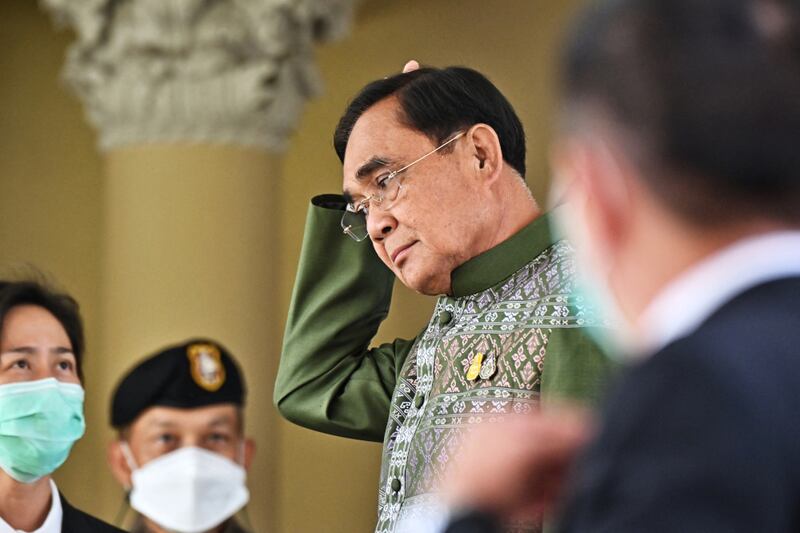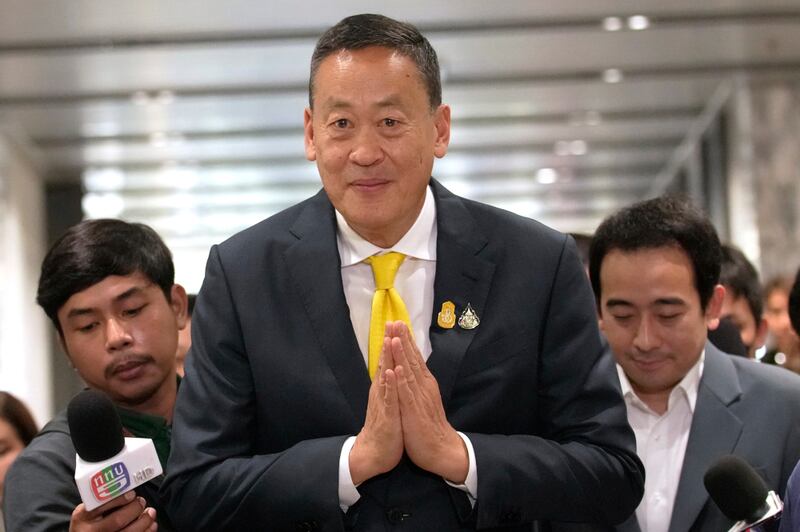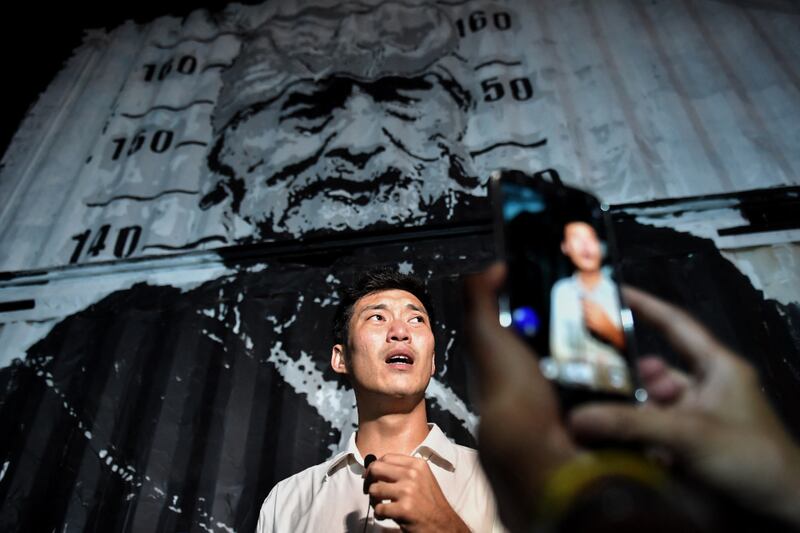“Pon,” a content creator who describes himself as being frustrated with Thai politics, said there was no way to make changes other than to be a part of the system – in this case the country’s 200-member Senate.
He is among those in the running to be selected to replace members of the legislative body appointed in 2019 by Thailand’s then-military rulers, and whose five-year term expires on May 11.
“If I had to vote to completely remove the Thai Senate, I would,” the 41-year-old told BenarNews. “But there is no other way to instigate change that I can think of.”
Pon is not this man’s real name. He requested that his identity be withheld because the Election Commission had ordered senatorial candidates to not talk to the media.
During their tenure, members of the old Senate were empowered to take part in parliamentary voting to elect the prime minister – a power they controversially used to block a progressive PM hopeful, whose party won the biggest share of votes in the 2023 general election. Members of the incoming and trimmed down Senate will lose that power, according to new rules.
Candidates for the new Senate told BenarNews that one of their goals is to change the Constitution regarding how senators are elected.
The new Senate will be formed with members being voted from among 20 social and professional groups including from the fields of education, law, health care, agriculture, the arts, as well as groups representing elderly people and people who are physically impaired. According to the selection procedure, each of the 20 groups will elect 10 members to the Senate. Applications are due on May 13.
The process, which will occur at the district, provincial and national levels by July 2, means the public will have no say because only candidates, age 40 or older, have the right to vote among themselves.

Last week, Prime Minister Srettha Thavisin's cabinet greenlit the new process for selecting members of the Senate, according to a report by Reuters.
On April 26, the Election Commission issued regulations relating to the Senate selection process. These include barring candidates from public campaigning, giving interviews to the press, or introducing themselves on media platforms.
Under the new rules for the Senate, the upper house of the Thai legislature will see its membership reduced from 250 to 200 senators.
In a recent Facebook post, Sawaeng Boonmee, the commission’s secretary-general, said because the lower House of Parliament is for “politicians” who are “members of political parties,” the Senate then, according to the Constitution, must be politically neutral, and “any lobbying or electioneering attempts are banned.”
Outgoing Senate
The incumbent 250-member Senate was hand-picked by the National Council for Peace and Order, the official name for the junta set up by Gen. Prayuth Chan-o-cha, the army chief who became prime minister after the 2014 military coup.
More than 100 of its members are active or retired military and police officers, including Prayuth’s brother, while the rest are seen as allies to the junta and opponents of the pro-democracy Shinawatra faction.
In the 2014 coup, military forces spearheaded by Prayuth deposed Prime Minister Yingluck Shinawatra. Yingluck's older brother, Thaksin, was ousted by a similar military coup in 2006 after months of street protests where he was accused of disrespecting the monarchy, abusing power and corruption. Pheu Thai, the party associated with the Shinawatras, is now back in power.
Throughout the current Senate term beginning in 2019, members have drawn scrutiny, not only over how they came to office, but on the extent of their power. Most controversially, they voted down Thai PM-hopeful Pita Limjaroenrat following his party's win in the May 2023 election.
The Move Forward Party was able to create a 312 House-member coalition after the election. But without enough support from the Senate, the party failed to receive at least 376 votes for Pita to lead the government, in a move seen as the establishment’s rejection of the electoral outcome.
“Essentially, the junta-appointed Senate has been a rubber stamp for ultra-conservatives,” said Paul Chambers, an analyst at Thailand’s Naresuan University who specializes in Association of Southeast Asian Nations (ASEAN) politics and security.
“However, it did approve the accession of Pheu Thai Prime Minister Srettha Thavisin, if only to avoid a more progressive Move Forward Prime Minister Pita,” Chambers told BenarNews.

The new Senate will not be able to vote for the next prime minister, meaning the top candidate will need only a majority of the 500-seat lower House – far fewer than those who supported Pita last year.
While Election Commission regulations on the Senate selection process require that names of candidates cannot appear in the media, those who were interviewed by BenarNews shared plans to upend the Senate’s oversized role which, they said, did not reflect the will of the Thai people.
“I think any institution should serve the people,” Pon said. “But if they get to office via the wrong means, they should not have a say in what the people demand.”
Other potential candidates questioned the process, adding they were running to change the Constitution.
A musician who spoke to BenarNews said he wanted to run for Senate because, “It’s a small way for the people to select the senators.”
“This self-selection process is very complicated. I’m not sure if the people can really benefit from this system,” he said.
A former academic who also plans to run said, “The self-selection process means the Thai voters’ rights are discarded. But I have my mission which is to amend the Constitution.”
Constitutional amendment
Thailand has kickstarted the process to amend the 2017 Constitution, drafted by a junta-backed committee. The process faced blockades while Prayuth was in power, but the Pheu Thai-led government and Srettha, the prime minister, said they were ready to support this move.
A constitutional amendment is seen as a crucial step to overturn what observers call “the Prayuth System” that influences mechanisms of Thai politics.
A third of the Senate is needed to pass a constitutional amendment bill. The outgoing Senate never voted to approve the amendment process.
Yingcheep Atchanont, director of iLaw, a Thai democracy campaign group, said the outgoing Senate was never neutral to begin with, given how members were appointed and how they voted for only those who shared their political views. Those votes were for members of independent organizations including the Constitutional Court, National Anti-Corruption Commission or even the Election Commission.
“I expect the new Senate to support the constitutional amendment. I want them to freely select officials of the independent organizations because in the past senators only voted for whoever represented their interests. I also want the new Senate to change how it comes to power in the future.”

The commission issued its warning against publicity by candidates after one of Thailand's most prominent activists, Thanathorn Juangroongruangkit, was seen traveling throughout the nation urging people to run for the Senate. Some have even criticized him for trying to put "the orange senators" in Parliament.
In 2018, billionaire Thanathorn founded the Future Forward political party on a progressive platform. After the 2019 general election, his party, whose party logo was colored orange, was disbanded and he and other party executives were handed 10-year political bans by the Constitutional Court. Pita’s Move Forward is an offshoot of Future Forward.
Yingcheep said there was no way to predict whose side would control the Senate – the progressive or the conservative – but he was certain it would be more diverse in terms of ideology.
Meanwhile, Chambers, the ASEAN analyst, expressed concern about the future.
“The new Senate is indirectly elected, which allows progressives to partially influence the Upper House. However, the Senate is still not fully elected as it was during 2000 to 2006,” Chambers said.
“I think the Senate elected after May will have a more progressive, democratic streak to it. But this will frighten conservatives, some of whom already support a new military coup in Thailand.”
